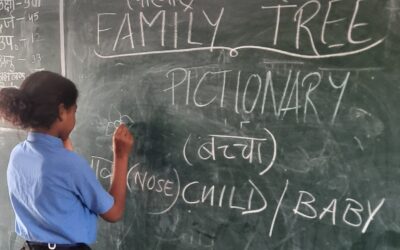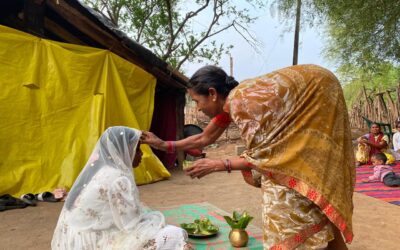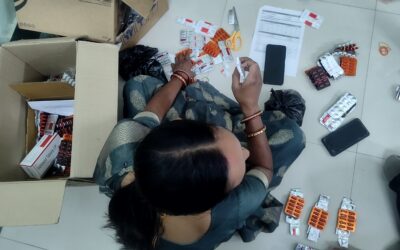Kanku* is the second youngest of 8 siblings, 5 sisters and 3 brothers. She was a bright kid at school and unlike her older sisters was able to complete school upto class 5. For high school she would have to travel to the next village, which wasn’t what many girls her age were allowed to do then. And so she had to quit school. By then her older sisters were already married and settled in the same neighborhood about 30 kms away from home. They found Kanku a groom from the same locality so the sisters could live close by.
Sanju* was a smart lad studying in class 7 at that time. He was the only son among 3 daughters which meant his word was valued above all the other women in the home, including his mother’s. After Kanku’s marriage to Sanju she immediately assumed the responsibilities of the household. She gave birth to their first child within a year of their marriage. Sanju continued school upto class 8, giving up to work in the field alongside his father. They sowed two crops a year, once maize and the other time wheat and black gram channa. The income from agriculture did not suffice the family’s needs, and like most of the young males in the village Sanju seasonally migrated to Ahmedabad to work in a hotel. Sanju would often also take up work through the NREGA scheme.
Kanku worked at the Phulwari (creche) in the village for 3 years before it had to be shut down, leaving her with no income of her own. While Sanju’s worked his friendship with another woman grew. The new couple were often seen chatting, walking off from the rest of the group, and sharing their meals aloof from the rest. News quickly spread to the entire village about the blooming attraction between the new couple. Although the Meena tribe practises monogamy, the number of men engaging in relationships outside marriage is considerable. Moreover, in most situations the marriage becomes toxic for the women involved when the man marries more than once in the presence of his previous wives. In such cases, the older wife often loses her rights, being left to fend for herself and her children.
Kanku was worried of her potential future if Sanju were to bring this other woman home as a wife. She was afraid, “I knew I would not be able to provide for my children all by myself, at the same time I could not confront him. Once when I brought up the topic he yelled so loudly and threatened to kill me. I had to keep quiet. After all he is my husband.”
Hostility in the house grew, leading to daily fights between husband and wife. Kanku was constantly worrying. One early morning when she was gathering branches along the stream to repair the roof, Sanju crept up from behind and attacked her. He strangled her throat till her face turned pale. He even hit her with stones till she bled. She was lying at the bed of the dried stream unconscious and bleeding profusely. Their eldest daughter found her and informed Kanku’s sister who promptly called for an ambulance. Kanku could not speak and had difficulty breathing for a month. She was hospitalized for 3 days after which her brother refused to let her go back to her husband’s home. Kanku’s sister who also bore the cost of the treatment adds, “We did not want to file a police complaint because they have such small children. They need their father. Who will bring them up?”
Kanku was recuperating at her maternal home for 4 months. With Kanku unable to work in the field they had a very poor yield of maize, a major setback for the family. Her children were growing weak too without their mother. “I had to make a tough choice of returning. I am still scared of my husband. I don’t know if he will hurt me again.”




0 Comments